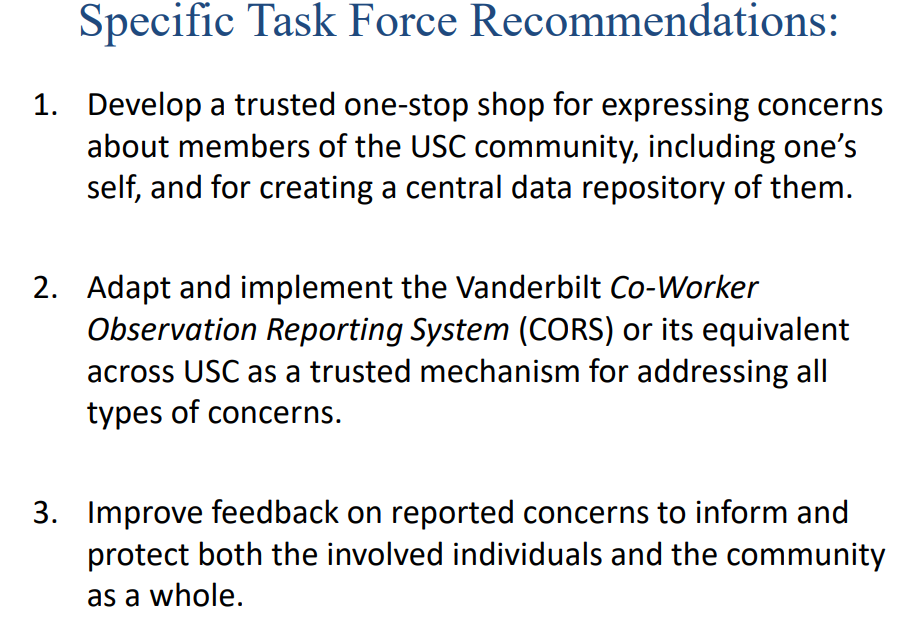Other articles in the March 2018 newsletter:
- President’s Blog
- Joint Retreat: Enhancing our Values and Culture
- Joint Retreat: Addressing Concerns of Community Members (this article)
- Joint Retreat: Strengthening our Leadership Model
On February 23-24, 2018, the Joint Provost/Academic Senate Retreat focused on “Towards a 21st Century University: Culture, Concerns and Governance.” This is part 2 of the 3 part summary of the sessions.
The second retreat session focused on the current state and possible future directions for addressing concerns of USC community members. The session, moderated by Norman Hollyn (Cinematic Arts), started with presentations from four panelists, followed by an in-depth audience/panel discussion and Q&A.
Jeffrey de Caen (Staff Assembly President; Associate Dean, Thornton) first provided attendees with a snapshot of how we currently address concerns about faculty and staff. He first pointed out USC’s offices and departments that handle concerns are geographically and functionally siloed, creating confusion about and among offices as well as difficulty in addressing the greatly varied types of reports and issues (legal, versus administrative/human resources, versus personal wellbeing). De Caen closed by stating the lack of a centralized database to connect all offices perpetuates the difficulties of siloes, limits feedback, and makes it difficult for people to know where to go for each type of concern.
Yaniv Bar-Cohen (Keck) then summarized the interim report recommendations from the Task Force on Workplace Standards and Employee Wellness about addressing concerns regarding USC community members. The three specific recommendations were: first, develop a trusted “one-stop shop” for reporting concerns to simplify the wide variety of reporting avenues, from which concerns would be triaged to the appropriate office. This “one-stop shop” would include a central data repository to allow for better tracking and follow-up. Second, adapt and implement a peer-based system such as the Vanderbilt CORS program (see presentation from John Brodhead below) to address all types of concerns and allow for higher level concerns to be dealt with immediately. The third recommendation was to improve feedback on reported concerns to protect the involved parties and the community as a whole.
Lynette Merriman (Associate Vice Provost for Support and Intervention) presented on the new Ombuds Office, the details of which are still being worked out. This office will be housed within the Office of Wellness and Crisis Intervention, and will be an informal, confidential, impartial and safe place to go for consultation, conflict resolution, mediation, and referral resources. She also spoke about the USC Support and Advocacy office, which is currently serving as a place for people to report concerns about other members of the USC community or themselves, and connects people to the offices or individuals on campus who can best help the situation. In times of crisis, they also reach out to the affected members of the USC community.
Lastly, John Brodhead (Keck) presented the Vanderbilt Co-Worker Observation and Reporting System (CORS), which is a reporting and intervention program that is designed to use tiered peer-to-peer coaching as a way to change institutional culture around safety and professionalism. CORS has been used with hospital systems across the country with good results and has been working well at Keck Hospital as well (it has not been implemented at Keck School of Medicine yet). This system was presented as a possible model for the Task Force’s proposed peer-based interventional system to promote culture and behavioral change at USC.
The audience discussion with the panelists afterwards mostly centered around the legal versus ethical boundaries of feedback to the reporting individual and community after a complaint has been filed, as well as questions about the scope and definition of retaliation after a complaint has been made. Issues such as the need for the Ombuds Office to be completely independent of administration, as well as whether student workers will be classified as students or employees when a complaint is filed against them were discussed.
To discuss go to our Facebook post.

Ashley Uyeshiro Simon, OTD, OTR/L, MSCS
Assistant Professor of Clinical Occupational Therapy
Mrs. T.H. Chan Division of Occupational Science and Occupational Therapy
Ostrow School of Dentistry

